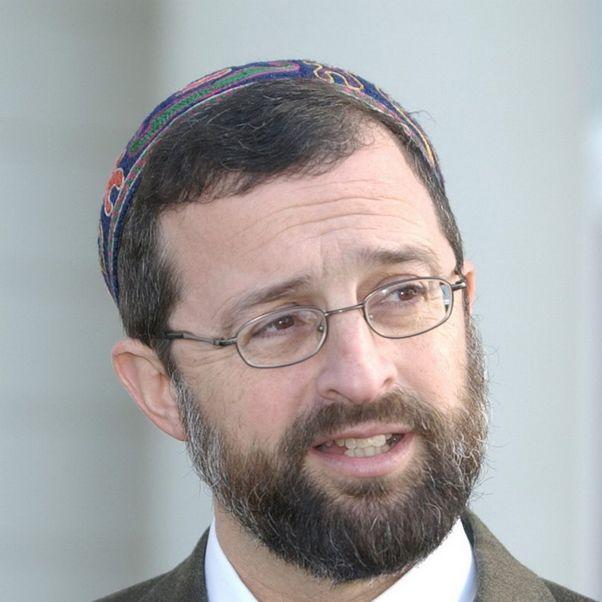Expelled Rabbi's Role in High Holy Day Service Condemned
By Jay Tokasz
A local organization of rabbis has issued a statement condemning a former colleague’s participation in High Holy Day services at Hillel of Buffalo, on the University at Buffalo North Campus in Amherst.
The statement by the Buffalo Board of Rabbis, sent at the end of October to the leaders of various Jewish organizations in Western New York, expressed “deep dismay and disappointment” that Rabbi A. Charles Shalman was invited to participate in a leadership role during Rosh Hashana and Yom Kippur services.
Shalman was expelled in 2008 from the Rabbinical Assembly over ethics violations related to an inappropriate relationship with a member of the Amherst synagogue where he served as rabbi, as well as previous allegations of misconduct dating from 1999.
“Clergy abuse is extremely serious, and is not ‘just an affair’ or ‘an imperfection.’ It is imperative that members of the clergy who have violated that trust be prevented from functioning in any way that might be perceived as being in the role of a rabbi,” the statement reads.
Hillel hired Shalman for its High Holy Day services after a deal with another clergyman, Rabbi Keith M. Karnofsky, fell through.
Karnofsky subsequently was among a chorus of critics who objected to the hire and voiced concern that Shalman’s presence on the pulpit was a potential danger to vulnerable female college students.
Karnofsky, a Jewish chaplain with the state Department of Corrections and Community Supervision, wrote a strongly worded letter to Hillel board Chairman Dan Lenard.
At the time, Lenard defended the hiring of Shalman, describing the rabbi as tremendously knowledgeable about Torah and deserving of a second chance.
“I still defend what I did, and so did my board,” Lenard said. “This is a tempest in a teapot.”
Lenard accused Karnofsky of being a “disgruntled employee” who was fired by the Hillel board and is now trying to get back at Lenard.
“It was his fault that this all happened in the first place,” Lenard said.
Shalman did not pose a danger to any student and was “totally supervised” during his Hillel work, Lenard added.
Although well-received at the services, Shalman will not be doing them again next year because of the controversy, Lenard said.
“Maybe it wasn’t a good idea, but it’s over. It’s water under the bridge. He’s not our rabbi. He’s not counseling our students,” he said.
Karnofsky resigned as president of the Board of Rabbis last week, saying he was concerned and disappointed that the organization wasn’t doing enough to inform UB students and their parents of Shalman’s record and should be more forthcoming with information.
In a cover letter to its statement, the Board of Rabbis requested that recipients confine the contents “to those who are the community’s decision makers.”
“They want everything kept real quiet. I can’t in good conscience keep it quiet,” Karnofsky said. “The way to solve the problem for the future is making it public, exposing it to the light of day.”
The Survivors Network for those Abused by Priests, or SNAP, a group critical of the Catholic bishops’ handling of clergy sex abuse allegations, also weighed in on the rabbis’ statement.
SNAP President Barbara Dorris called it “better than nothing, but not much better. It’s late, weak and, perhaps worst of all, it tragically perpetuates the dangerous and long-ago discredited notion that it’s best to keep quiet about clergy sexual misconduct.”
Dorris also said that secrecy “benefits the guilty and the manipulative” and “endangers the innocent and the trusting.”
By resigning the presidency, Karnofsky said he can now be more vocal about the issue. Rabbi Alex Lazarus-Klein of Congregation Shir Shalom in Amherst, who succeeded Karnofsky as president Friday, acknowledged that the statement was not sent to news media but said that it wasn’t a secret document, either.
“It was sent to all agency leaders,” he said. “It’s not something we’re embarrassed about.”
Lazarus-Klein also said the board was planning educational activities on the topic of sexual abuse.
“We’re trying to prevent it from happening again,” he said. “We have an obligation to protect community members as much as possible. … We do not take this issue lightly. It’s with a great deal of gravity and sadness that we approach this.”
Shalman served as rabbi of Temple Shaarey Zedek in Amherst from 1995 until his resignation in 2008, when he was accused by a member of the synagogue of having an inappropriately close relationship with the member’s wife.
It was the second time in his tenure at Temple Shaarey Zedek that Shalman faced allegations of misconduct. In 1999, an investigation by the Rabbinical Assembly’s ethics board concluded that Shalman had violated several principles of rabbinical conduct in his private counseling or teaching sessions with female members of the synagogue. The violations included improper touching and suggestive comments.
The congregation voted to retain Shalman, who had to undergo therapy and refrain from any future one-on-one teaching with women.
But following the 2008 allegation, the Rabbinical Assembly expelled Shalman, effectively meaning that synagogues affiliated with the Conservative Judaism movement cannot hire him.
Lazarus-Klein said the board has had “private meetings” with Shalman to discuss what happened.
Hillel tried to do its best in a difficult situation but erred in turning to Shalman, he said.
“It was a real last-minute decision made in haste,” Lazarus-Klein said. “The Board of Rabbis will have more of a role on the Hillel board to be a support to them.”
|
.
Any original material on these pages is copyright © BishopAccountability.org 2004. Reproduce freely with attribution.
